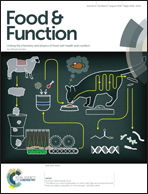Sulfated polysaccharide from Enteromorpha prolifera increases hydrogen sulfide production and attenuates non-alcoholic fatty liver disease in high-fat diet rats†
Abstract
Enteromorpha prolifera is an edible alga and previous studies have indicated that E. prolifera polysaccharide (EP) attenuates non-alcoholic fatty liver disease (NAFLD) in high-fat diet rats. Hydrogen sulfide (H2S) has recently been found to exert many physiological effects. The purpose of this study was to evaluate whether EP prevents NAFLD via regulation of H2S production. EP was orally administered to high-fat diet rats for 5 weeks. Treatment with EP (200 mg per kg body weight per d) significantly increased the serum H2S level and reduced the serum triglyceride level (p < 0.05) in rats fed a high-fat diet. These effects were similar to those observed with NaHS, a H2S donor. Real-time PCR and western blotting analysis revealed that EP significantly upregulated hepatic mRNA and protein expression of cystathionine-β-synthase, which is the enzyme responsible for H2S production. These results indicate that EP decreases the serum TG level by increasing H2S production, suggesting that EP may be beneficial for the treatment of NAFLD and may reduce the risk of cardiovascular disease.



 Please wait while we load your content...
Please wait while we load your content...